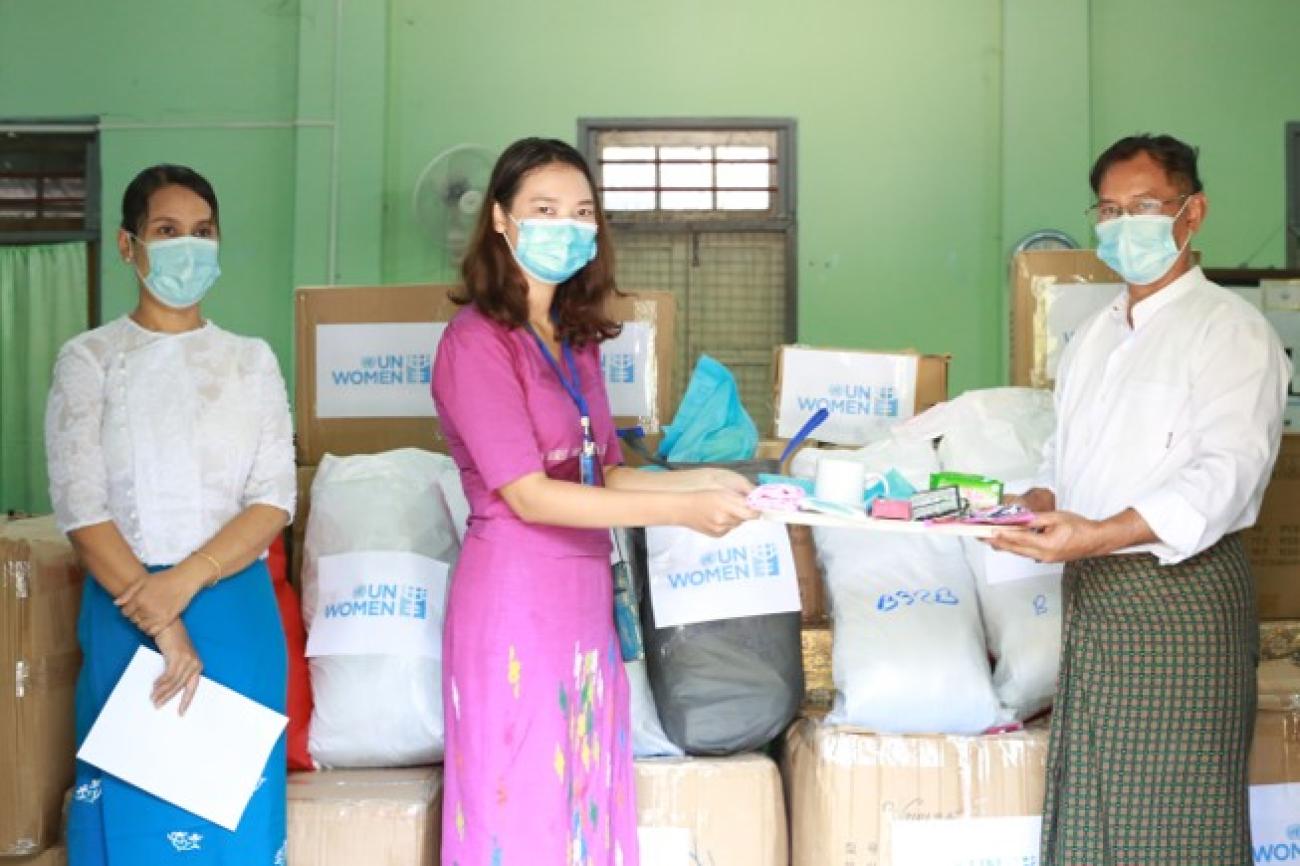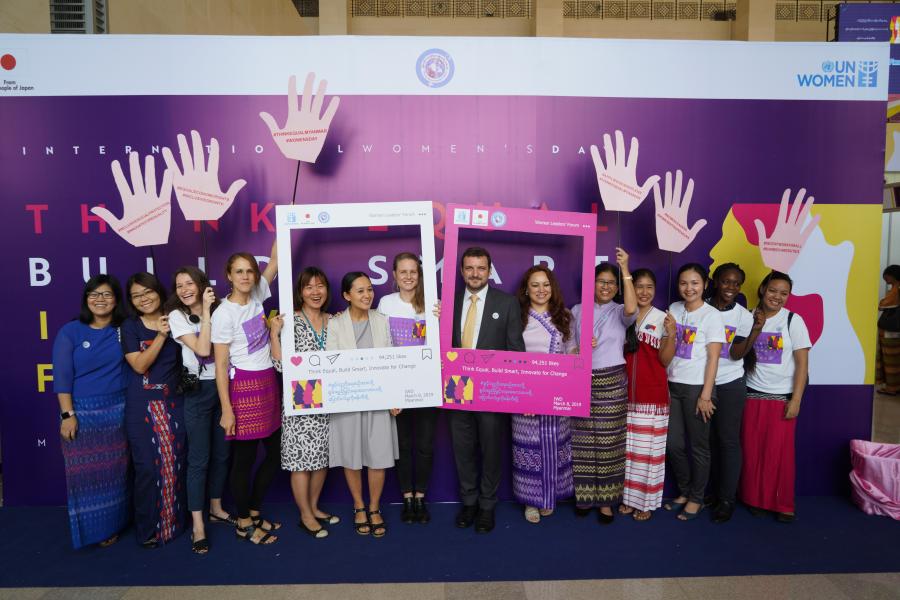Women at the forefront of Myanmar’s COVID-19 response and recovery efforts

The UN in Myanmar has come together as one to support COVID-19 preparedness and response. The first in a series of articles, highlights the work of UN Women.
The UN Secretary-General Antonio Guterres has said that ending the pandemic everywhere is both a moral imperative and a matter of enlightened self-interest. Extraordinary times demand extraordinary measures. We face a colossal test which demands decisive, coordinated and innovative action from all, for all. In Myanmar, the UN has come together as one to support COVID-19 preparedness and response. In the first in a series of articles outlining the work of the UN Country Team, UN Women highlights the work being done to ensure that women and girls are at the centre of efforts to prevent, respond to and recover from the pandemic.
While the COVID-19 pandemic is affecting everyone, it is having a devastating impact on women and girls across the world. In Myanmar, UN Women, the lead UN agency for gender equality and the empowerment of women, is working hand in hand with all the other UN agencies to ensure that the UN Country team collectively responds to the call of the Secretary General to put women and girls at the centre of efforts to prevent, respond to and recover from the pandemic.
In the early days of the crisis, UN Women focused on supporting the capacity of the Department of Social Welfare within the Ministry of Social Welfare, Relief and Resettlement to continue its essential work in support of women and girls and its efforts to mainstream gender through the government’s response. This entailed providing Department for Social Welfare (DSW) with laptops to allow them to work under lockdown and equipping 60 DSW social workers across the country with new cell phones so that they could operate the COVID-19 and violence against women 24/7 hotlines set up by the Ministry. UN Women also provided training to DSW on the gender dimension of the COVID-19 crisis and provided MSWRR with localized policy and programmatic tools on how to ensure that response efforts fully include the needs and role of women and girls.
UN Women has also adapted its ongoing programming to ensure that it responded to the crisis. This includes supporting women transition their livelihood activities towards mask production ensuring masks produced by women were distributed to populations in need through humanitarian actors and state government authorities. A first batch of masks were recently distributed in quarantine centres in Rakhine states while Hygiene kits were distributed to the Department of Social Welfare in Mon State and UN Women is currently procuring an additional 44,000 masks, all produced by rural women, to be distributed in Kayin and Rakhine States.
UN Women’s work includes support to women’s organizations and networks which are already at the frontlines of the response. UN Women partnered for instance with GEN to strengthen the coordination of women civil society efforts to respond to the crisis and partnered with Women’s Organization Network (WON) to support gender-sensitive management of community-based quarantine centres for migrant workers in Kayin.
UN Women is currently working to expand its contribution to the COVID-19 response in Kachin, Kayin, Mon and Rakhine State ensuring that in all States local authorities fully integrate the needs of women and girls in their local response strategies and plans, women and girls needs are met, and women are supported to lead response activities. UN Women will also continue to work with MSWRR to ensure that the government response fully includes the needs of women and girls and will support DSW with COVID-19 specific advocacy campaigns focusing on the importance for men to engage in care work and on prevention of domestic violence.
UN Women’s ongoing programmes continue despite the pandemic
UN Women’s COVID19 work is building on UN Women’s ongoing work which focuses on supporting the capacity of the government of Myanmar and of the national women’s machinery at national and local level to implement the Myanmar National Strategic Plan for the advancement of women and mainstream gender into national and local policies and plans, as well as on supporting women’s leadership and livelihood in Kachin, Kayin, Mon and Rakhine states in order to strengthen social cohesion and ensure durable solutions with a specific focus on crisis affected women and migrant women.
Thanks to a new project on gender responsive governance soon to be launched, UN Women will be able to scale up its technical and coordination support to DSW, MSWRR and the MNCW and thus, their ability to lead and coordinate the gender aspects of the crisis response. This will include support to start piloting gender responsive budgeting in partnership with DSW, the Ministry of Planning and Finance and the World Bank, an intervention which globally as proven key in strengthening the gender responsiveness of the government responses to crisis.
In Mon, Kayin and Kachin, UN Women will strengthen its support to the implementation of state government plans for the local implementation of NSPAW in the COVID19 context, building among other things on the Kayin and Mon states 3 years Women, Peace and Development Plans which were launched in December of 2019 with support from UN Women and thanks to funding from the government of Norway, and on the Kachin State Women Network’ Common Charter of Demand by Women’s Group for Gender Equality and the Empowerment of Women across the Peace-Humanitarian-Development nexus which was supported by UN Women in 2018. In those states as well as at Union level, UN Women will also work through its Safe and Fair project under the Spotlight initiative, supported by the European Union to ensure that services responding to the specific needs of women migrant workers are strengthened.
In Rakhine, with support from the governments of Canada, Germany and Japan, UN Women will continue to work in partnership with UNDP to support gender responsive governance, promote women’s leadership and support women livelihood, ensuring that activities contribute at the same time to the COVID19 response.
Gender equality and women’s rights are essential to building a better and stronger peace, economy and democracy in Myanmar
While the COVID19 is an unprecedented crisis, it offers Myanmar a unique opportunity to recognize the leadership that Myanmar women play in all segment of society, including as front line healthcare workers, and to properly value the contribution that they make every single day as primary care givers at home and in their communities. This in turns could contribute to the recognition that gender equality and women’s rights are essential to building a better and stronger peace, economy and democracy in Myanmar.





